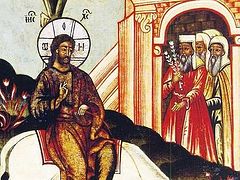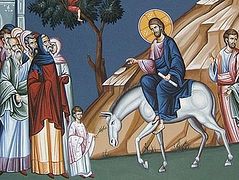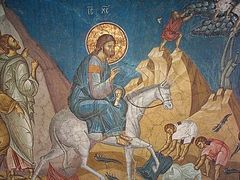In Jerusalem and its outlying areas a strange phenomenon occurred during the week before Passover. Amazing stories were being spread around from person to person about Jesus from Galilee. They told of how He taught and how His teachings softened and transformed the human soul, how He lived and worked. Masses of people were witnesses and even direct participants of such transformations—the incurably ill were made healthy, lepers were cleansed, and rude, vain, and cruel people became meek, humble, and kind. News had spread about Jesus so that the masses sensed a miracle worker in Him, a Savior Who had the power to resurrect both soul and body. Millions of people were on fire with impatience to triumphantly meet Jesus in Jerusalem, and in their sincere admiration to place a beginning to their reverence and love for the Lord, to accept Him as the awaited Messiah, and give Him their hearts and souls. In this exalted mood the millions of jubilant folk were led to this admiration by the Savior’s twelve disciples. Their joy could not be restrained. They thought without a doubt that the time of endless joy had come not just for them but for the whole world. The disciples’ gaze was turned to Jesus. They wanted their Teacher to be in the same mood as they were. But the Lord’s gaze was meek, and His speech restrained. Amidst the general ecstasy the Savior suddenly pronounced: Now we are entering Jerusalem. Here the Son of Man will be betrayed; He will be condemned to death, and the people will give Him over to be mocked, scourged, and crucified (cf. Matt. 20:18–19). For the disciples in their jubilant mood, the Savior’s words were unexpected, like thunder clapping across a cloudless, clear, and warm day. Nevertheless, they understood the weighty truth in them. There was another meaning in these words as well: Firstly, the Savior wanted His disciples to understand that after these days of human jubilation will come days of serious temptation for both Jesus and those who love Him; secondly, that man’s jubilant mood is an inconstant thing; and thirdly, the Savior was showing the true path leading to a constant joyous state, even in days of fear and trembling. The Savior’s words taught them to be cautious about giving themselves over to exaltation, and at the same time they were taught how to act and what to do during the coming days.
The din of the masses met Jesus with exclamations of, “Hosanna!” The aged and the young, women and men with palms in their hands merged into one whole voice. Their cheerful shouts, like a living, thunderous bell, announced the entrance of the King of kings into the royal city. This living bell did not evoke feelings of approval in the Savior. In this roaring, busy expression of euphoria there was no sign of deep feeling—only a triumphant and fine outward appearance. “Glory to God” was only the noisy shout of the vociferous masses, and it disappeared without ever touching their hearts. In the triumphant meeting of the Savior was the festivity of idle people, but not the proclamation of sincere faith. This triumphant hubbub completely lacked any inner inspiration. The people noisily celebrated like a dazzled flock of birds. People are often like these folks meeting the Savior. Human glory and social honor are but glimmering fireworks that turn the next minute into nothing but sulfurous ash. It is like a springtime flood that brings an abundance of water, with waves rushing ahead of each other in a seeming effort to overtake and drown each other. Such manifestations are not stable. That is why the Savior warns His followers of all times to be cautious about accepting public opinion as truth, no matter what it is about. Public opinion is a wave that forces its way in and carries us away. Now it is with us, tomorrow it is against us. Man must be guided not by public opinion but by the commandments and Law of God, and not by what is transient and mutable.
All the inconstancy of public opinion was quick to show itself on Jesus Christ. The scattered palm branches upon which the holy feet of the God-man had walked did not yet withered on the road before the bell toll of excited elation died out among the people. In place of joyful shouts, in place of lively discussion comes irritation and anger, and dreamy schemes begin; instead of the word, “Hosanna” comes the word, “Crucify”; instead of a throne, execution on Golgotha. Thus after the day of triumph come days of onerous sorrows, suffering, and finally death on the Cross for Christ the Savior. Now the Lord’s companions decrease in number to only a faithful and friendly few. Everyone else has abandoned, rejected, and betrayed Him, and even the Savior’s best and beloved had denied Him. Events had given a clear lesson: that we should be faithful in friendship, and not abandon someone in troubles and afflictions. Only in times of troubles can we truly discern dignity, friendship, and love. These great human bonds are illuminated by this Gospel event. They are strengthened noiselessly, not with shouts, not in emotional excitement, but quietly and modestly, like a spark of gentle, radiant light from a pure candle illumining the nocturnal darkness.
Not ecstatic over the triumphal reception given Him in Jerusalem, the Savior looked favorably only upon the children, the babes who greeted Him with, “Hosanna”. By this He showed what kind of exaltation is appropriate to the dignity of man. Exaltation is the expression of a pure, impeccable, living, and guileless heart. All people, regardless of age, have this divine gift in their souls. Nevertheless, not only exaltation but even heartfelt joy is impossible for quite a few people. It is impossible for the lazy and careless; rest is only sweet and pleasant after hard work, just as the pleasure of good health is natural after pain. Heartfelt joy is impossible for the impatient, the irritable, the ill-willed, the envious, and the vengeful. Their bright countenance of consolation and love can suddenly cloud over. Such people are ready to crash down a priceless vase only out of the caprice that other people are taking flowers from it. The feeling of joy is not full for all who are possessed with various and sundry passions—to such an extent that they are capable of destroying even family ties and ripping a son, mother, or friend from a loving soul.
But the Savior has not closed the entrance to the Heavenly Kingdom against any of us. Through repentance and the desire for correction the door can open in any soul, and through it we have access to Christian joy. Christ asks to dwell in every soul. Even in times of sorrow and temptation He does not close the door of divine mercy. One thing is required—to follow after the suffering Lord. After all, He suffered for us in order to leave us an example, so that we would follow in His footsteps, declares the apostle Peter (cf. 1 Pet. 2:21). Passion Week is now beginning. Let each of us draw nigh to the suffering Savior, let each of us accompany Him, step after step, to the end of the way of the Cross, and then let our lives be corrected. Our hearts, tried by suffering and sorrows, will become contrite. Thus, O Christians, let us turn our gaze in the coming week to the Lord; let us look with the weeping women of Jerusalem at how He, the Lord of heaven and earth, is condemned to death for our sins, carries His Cross and loses strength beneath its weight. Let us carry His Cross. Listening to the Gospel readings during Passion Week, let us strive to be penetrated with the Son of God’s measureless grandeur of suffering and achievements. We shall heed the meek and loving voice that calls all to joy—to the joy of blessed hope for salvation. There is room for everyone before Christ’s passion—for publicans, harlots, and thieves...
If this takes place then we can truly and with pure hearts celebrate the most radiant Resurrection of the Lord and the resurrection of our own souls that were dead in passions and sins! Let all who wish set out upon the path to acquiring heavenly consolations and joys; let us all set out upon the way of the Cross—all who need to be freed from the oppression of filthiness. Do not forget that Christ will be with us on this path, suffering and compassionate. Amen.




